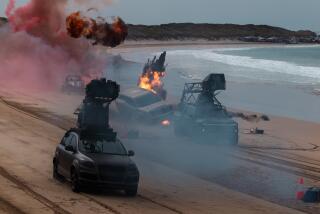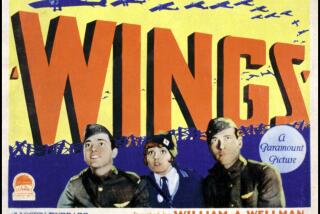Bobby Hoy dies at 82; stuntman and actor
- Share via
Bobby Hoy, a renowned stuntman who also acted, most memorably as a ranch hand on the television series “The High Chaparral,” has died. He was 82.
Hoy, who co-founded the Stuntmen’s Assn. of Motion Pictures, died Monday at Northridge Hospital Medical Center from cancer, said his wife, Kiva. He lived in Sherman Oaks.
The New York City native was known in Hollywood for his natural ability with horses, a talent nurtured during a childhood often spent on a ranch in the Catskill Mountains.
“He just knew what to do with horses,” said Kent McCray, a producer who first hired Hoy in 1960 for the TV series “Bonanza” then worked with him as a stuntman-actor on “The High Chaparral,” which aired from 1967 to 1971.
“As an actor, he was always relaxed and knew what he was doing,” McCray told The Times. “He was wonderful, always looking out for everybody.”
Film historian Alan K. Rode said Hoy “really was one of the few stuntmen who made the transition to acting who was comfortable doing both.”
From 1949 to 2005, Hoy acted and performed stunts in more than 150 film and television productions.
He appeared “in just about every western television series over the last half-century,” including creating the role of Joe Butler on “The High Chaparral,” Rode said.
On the set of the 1960 film “Spartacus,” Kirk Douglas accidentally cracked one of Hoy’s ribs when he rammed a fake sword into the stuntman’s side. While hanging upside-down on the 1980s TV series “Magnum, P.I.,” Hoy broke his leg and ankle during a stunt.
“I recovered and got back to work. I didn’t think twice about it,” Hoy told The Times in 2008. “That’s just part of the business.”
His most dangerous stunt was accomplished in a fast-moving river current for the 1958 film “The Defiant Ones,” Hoy later recalled.
As the stunt double for Tony Curtis, Hoy navigated the Kern River rapids while chained to Ivan Dixon, who was Sidney Poitier’s double in the film about two shackled prisoners on the run.
“We were just passengers” in the hazard-filled water; “there was no element of control,” Hoy told Leatherneck Magazine of the Marines in 2002. “All we could do was try to stay alive, but it all looked great on film.”
In an interview with Turner Classic Movies, Curtis called Hoy “an excellent stuntman” and acknowledged their resemblance. They also worked together on the 1959 movie “Operation Petticoat.”
In 1961, Hoy co-founded the Stuntmen’s Assn., which helped professionalize stunts, according to its website.
For the 1990s TV series “Zorro,” Hoy stepped behind the camera as a second-unit director and stunt coordinator in Spain.
Days before he died, Hoy received the Golden Boot, an award given by the Motion Picture & Television Fund to those who have made significant contributions to the western genre.
“Bobby Hoy brought joy to everyone around him,” said actor Wilford Brimley, a close friend who worked with Hoy in movies and the 1980s TV series “Our House.” “He certainly left the world a better place than he found it.”
Robert Francis Hoy was born in 1927 and raised by his mother after his parents divorced. His mother, Elizabeth, was a lingerie manufacturer. He also had a sister, Mary Ann, who died in 1962.
Hoy started working part time on a ranch at age 7 and stopped only when he joined the Marines near the end of World War II. He helped deliver home former prisoners of war.
In 1946, he took a job as a cowboy on a Nevada ranch. A few years later, he was jumping horses over high fences for his first western, “Ambush.”
Whether on his lapel or hat, Hoy always wore two pins: One honored the Marines, the other the fraternity of stuntmen.
Besides Kiva, his wife of 22 years, Hoy is survived by his son, Christopher, of Bali, Indonesia.
More to Read
Start your day right
Sign up for Essential California for the L.A. Times biggest news, features and recommendations in your inbox six days a week.
You may occasionally receive promotional content from the Los Angeles Times.







